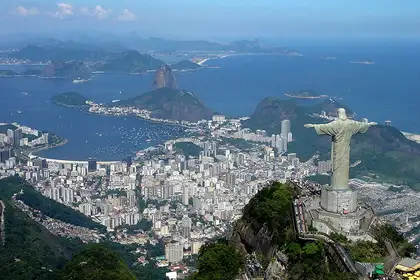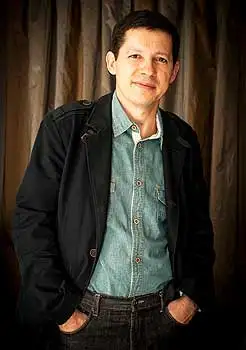
View of Rio de Janiero in Brazil (Wikimedia Commons).
New opportunities in business, culture, education, trade, tourism and diplomacy with Brazil could open up for Kiwis with the launch of the country’s only tertiary-level Portuguese language programme at Massey University.
The new offering has been developed by language specialists in Massey’s School of Humanities in partnership with Brazilian language teaching experts in a programme tailored for New Zealanders.
Portuguese, the national language of Brazil, will be available at the Wellington campus and by distance learning. The suite of language and culture courses have a focus on Brazilian Portuguese and are open to anyone interested in one of the most widely spoken languages in the world, says Associate Professor Leonel Alvarado, who will head the new programme.
The new language programme, available from next year, will be launched this week at a special event co-hosted by Massey’s College of Humanities and Social Sciences and the Brazil Embassy in Wellington.
Many Kiwis are familiar with Brazil beyond the popular images of soccer, samba and the Amazon following the 2016 Olympic Games in Rio, but there is more to discover about its rich history, culture and geography, says Dr Alvarado, the head of Massey’s Spanish Language programme. With a population of more than 200 million, Brazil is the largest country of South America, covering more than half of the continent’s landmass, and is the fifth largest country in the world.
In 2019, students will also have the opportunity to apply for scholarships to spend from four to six weeks in Rio de Janeiro and São Paulo. Other opportunities include the chance to be awarded the annual Embassy of Brazil Prize, to take part in Brazilian cultural events organised by Massey University and the Brazilian Embassy, and to connect with the Brazilian community throughout New Zealand.
As well as those with a penchant for Portuguese language and dreams of travel, Dr Alvarado suspects Spanish language teachers in New Zealand may be keen to learn because of the close connections between the languages. Kiwis with Brazilian heritage, or a Brazilian partner or spouse, as well as those with business interests in Brazil might be interested in learning too, he says.
Courses are designed to progressively develop communication skills in oral and written Portuguese, from introductory to advanced level, so no previous knowledge of the language is needed to enrol.
Dr Alvarado says the course will allow participants to develop understanding and appreciation of Brazilian culture and heritage (and more widely, Lusophone – a community of people culturally and linguistically linked to Portugal).
Aside from Portugal and Brazil, Portuguese is the official language of several countries (including former Portuguese colonies) such as Angola, Mozambique, Cape Verde, Guinea-Bissau and – closer to home – Timor Leste, and is spoken by 260 million people world-wide.
Brazil’s Ambassador to New Zealand, Paulo Camargo, says that when you learn another language; “you open windows to another culture, making it easier to access new ideas and to interact with different people. Portuguese is the third most spoken language in the Western Hemisphere.
“The Portuguese course at Massey University will offer an important tool to build new relationships between people from New Zealand and Brazil,” Mr Camargo says. “Knowledge of the Portuguese language will certainly make it easier to approach a huge market of more than 200 million consumers.”

Associate Professor Leonel Alvarado.
A Latin American century?
The introduction of the new language programme is the latest development in an ongoing relationship between Massey and the Federal University of Rio de Janeiro (UFRJ). The programme will be taught by a visiting lecturer from UFRJ, Dr Christine Oliviera.
The launch follows a recent high-level delegation from Massey’s College of Humanities and Social Sciences to São Paulo, Brazil, led by its Pro Vice-Chancellor, Distinguished Professor Paul Spoonley, The visit consolidated work began four years ago when the college decided to target Brazil as part of a broader Latin American strategy, resulting in the signing of academic collaboration agreements with the top public research-led universities, the Federal University of Rio de Janeiro (UFRJ), the University of Sao Paulo (USP), the University of Campinas (UNICAMP) and the State University of Sao Paulo (UNESP). With the UFRJ, the School of Humanities and Te-Pūtahi-a-Toi (the School of Māori Knowledge) has also established a language revitalisation project with the Kaingang indigenous community, a native American community in South Brazil.
Associate Professor Kerry Taylor, head of the School of Humanities and leading Massey’s engagement with Brazil, says the Portuguese language programme is “a product of our deep commitment to internationalisation driven by building long term sustainable relationships in Brazil rather than a simple monetary or transactional driver.
“Language and cultural knowledge are positive in themselves, but also lead us to common research interests and staff and student exchange. We’re working with partners in Brazil on the next phase of our commitment including the possibility of a New Zealand week in Brazil, the hosting of an indigenous Brazilian craft exhibition in New Zealand and teaching New Zealand-focused courses in Brazil. We’re trying to make the 21st century a Latin American century. We think we are succeeding very well in this!”
For more information, check the webpage: www.massey.ac.nz/portuguese